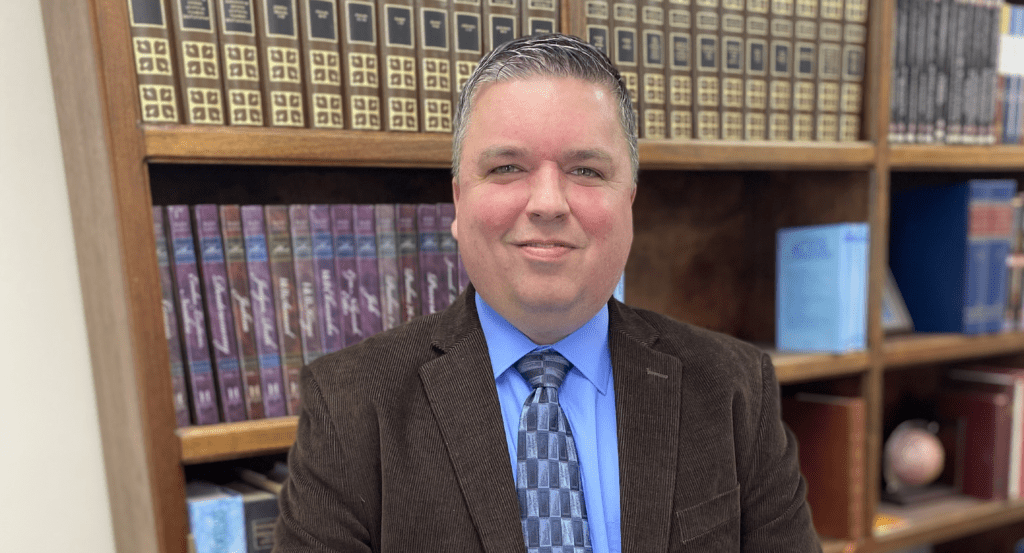Many of my fondest memories involve books—scanning my father’s bookshelves as a boy, perusing the set of print encyclopedias displayed in my family’s living room, growing in faith as a teenager while reading missionary biographies, like Jesse Fletcher’s Bill Wallace of China.
My father often took me and my siblings to the local library in the small, western Oklahoma town where I grew up. It was a treat to spend an hour there, letting my mind roam free among so many books. The library was a haven from the bustle of life, and a place where I could learn and dream. Even today, I can think of few pastimes more pleasurable than visiting a well-stocked, clean, quiet library.
Unfortunately, many libraries have been caught up in a bustle of controversy in recent years – and for good reason. This is especially the case in public school libraries.

Benjamin Hawkins, editor of The Pathway
“During the last few years, parental groups concerned about the material in public school libraries and classrooms had the momentum, spurring lawmakers on to pass measures curtailing explicit material,” WORLD magazine essayist Janie B. Cheaney wrote earlier this year. “But now, judges are weighing in, siding with progressive groups challenging those new protections.”
Cheaney explains: “Florida lawmakers kicked off the so-called book ban furor in July 2022 with H.B. 1467. It requires all school reading materials to be vetted by media specialists trained to evaluate critical race theory, explicit depictions of sex, or age-inappropriate discussions of gender identity or sexual orientation. An uproar ensued, and when Florida schools opened in the fall of 2022, some librarians posted pictures of empty shelves with the claim that all the books in the collection had to be restricted until they received official approval.
“Never mind that some of those books contained material too shocking to be read during the public comment portion of local school board meetings. The state’s education commissioner, Manny Diaz, suggested some common sense might be in order. Florida’s H.B. 1069, passed in May 2023, includes one such commonsense guideline: ‘A district school board must also discontinue the use of any material the board does not allow a parent to read out loud.’
“Since 2022, Texas, Missouri, Georgia, Utah, Tennessee, Virginia, Iowa, and Arkansas have either passed new legislation or amended existing laws to restrict, review, or remove controversial titles. West Virginia, Nebraska, South Carolina, North Carolina, Pennsylvania, and Utah are considering similar restrictions or guidelines.
“But Newton’s third law of motion is still in effect. Actions promote equal and opposite reactions, and 2023 was notable for stays, injunctions, and blocks by federal and district courts. …
“The current flurry of legislation and counter lawsuits indicates the limits of the law when free expression is at issue,” Cheaney concludes. “Community standards are easy to maintain when the community agrees, but in a culture as divided as ours, the burden of vigilance will increasingly fall to parents.”
In recent months, I’ve heard from several Missouri Baptists working to protect children from books that promote the LGBTQ agenda and that contain other sexually explicit material, and I applaud their desire to do so. Christian parents should pay close attention both to their own reading, as well as their children’s.
On an optimistic note, as Cheaney says, parents—and readers more broadly—“don’t have to focus entirely on the negative,” since homes and libraries and bookstores are filled with many books worth reading. As the summer months approach, consider picking up and reading one of the following:
• Discovering Jesus: Why Four Gospels to Portray One Person?, by T. Desmond Alexander;
• Can We Trust the Gospels?, by Peter J. Williams;
• Jesus Asked: What He Wanted to Know, by Conrad Gempf;
• After Acts: Exploring the Lives and Legends of the Apostles, by Bryan Litfin;
• Pontius Pilate: A Novel, by Paul L. Maier;
• The Pilgrim’s Progress, a classic by John Bunyan that is worth repeated reading;
• The Complete English Poems (Penguin Classics), by George Herbert;
• To the Golden Shore: The Life of Adoniram Judson, a classic and fascinating missionary biography by Courtney Anderson;
• Lost Shepherd: What Believers Once Knew about Psalm 23 that the Modern World has Forgotten, by Missouri Baptist pastor Mark Fugitt;
• God of Liberty: A Religious History of the American Revolution, by Thomas Kidd, who has also written some great biographies of Thomas Jefferson, Benjamin Franklin, Patrick Henry and George Whitefield;
• God (Theology for Every Person, Book 1), the first in a three-part systematic theology by Southwestern Baptist Theological Seminary professor Malcolm B. Yarnell III.
Enjoy your reading.

